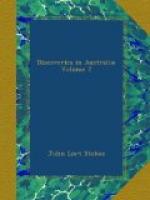There was only one drawback to the pleasure I experienced on arriving in England—namely, that Lieutenant G. Gore did not obtain his promotion, but was compelled to seek it by a second voyage to the North Pole. All the mates were, in the course of a short time, promoted, and the ship’s company received the favour of having half of their slop bill deducted, an indulgence which the Lords of the Admiralty, from the kindest and most considerate motives, have in some instances bestowed upon the crews of surveying vessels, on their return from distant voyages. This boon, however, in some instances, operates unfairly. In the first place, it often happens, in spite of the strictest surveillance, that the worst characters will, if they can, take up the greatest quantity of slops, which they convert either into money or grog, whenever an opportunity presents itself. The really steady men generally look clean and neat as long as possible, without much assistance from the purser. Then again, the boats’ crews of all surveying vessels are necessarily so much more exposed, that they not only the sooner wear out their ordinary clothing, but absolutely require additional comforts in that way. I am therefore strongly of opinion that, in this department (and I speak from experience) the Captain should be allowed a certain portion of slops, to be placed at his disposal, and distributed under his sole authority; or might not he be enabled to recommend a certain number of the best men for a small increase upon their regular pay? This judicious exercise of discretion would be the means of retaining in this important branch of the service, a class of men who would become most valuable to their officers when engaged in the arduous and responsible duties of a survey.
As in the Royal Engineers, a great deal of the superior talent of the officers might be better bestowed, by abandoning to the petty officers the rougher part of the surveying work, in which calculation is not required. For this purpose, a kind of instruction might be imparted, which that class of men, if encouraged by extra pay, is capable of receiving, particularly those who have had the advantage of a Greenwich education.
To strengthen the suggestions I have made regarding the surveying service, I cannot refrain from alluding—and I do so with honest pride—both to the actions in China, and the very recent gallant destruction of the Argentine batteries in the River Parana, as instances of the importance of this branch of the profession in time of war. During peace the new countries that are explored, and the new fields of commerce that are opened to the world, will speak for themselves.
...
APPENDIX.
WINDS AND WEATHER ON THE WESTERN AND NORTHERN COASTS OF AUSTRALIA.
BY COMMANDER J.C. WICKHAM, R.N.
The winds on the western coast of Australia, are, for the most part, from some southern point—chiefly between South-South-West and South-South-East.




